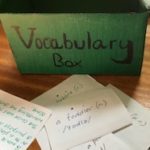Teaching Teenagers
I’ve recently been working with a non-native English speaking English teacher from Spain on a home stay English refresher course. She’s taught English to adults for many years in a language college but in September will be teaching High School students. Like most of us who’ve become comfortable with a certain age group, she’s feeling some trepidation. We had a lot of conversations about teaching teenagers.
What makes teenagers different from adults?
Motivation – Adults generally choose to learn a language whether for integrative (interest) or instrumental (e.g. jobs) reasons. Adults tend to have more choice over if, when and how they learn. Furthermore, classes require a certain amount of investment of time and/or money, which may increase motivation. On the other hand, teenagers may have little choice in whether they study English and probably no choice in how, when or where.
Energy – The majority of adult learners tend to juggle their studies with work and family commitments. Energy levels can be low after work, and homework or personal study may not be a priority. Teens tend to have more energy generally and should have time reserved for homework tasks.
Behaviour – Classroom management may be more of an issue with teens due to energy levels or lack of motivation.
Building motivation
Why study English?
With adult students we often take the ‘why’ for granted – after all they’ve found a course, enrolled themselves and turned up. With teens it may be helpful to discuss the benefits of learning English and demonstrate what they already know about the language.
First Day Activities:
Quiz
How many people speak English? (1.5 billion/20% of the Earth’s population Babel.com)
How many countries can you name that have English as an official language? (The UK, the USA, Australia, Canada, New Zealand, Ireland, Botswana, Cameroon, Fiji, Ghana, India, Hong Kong etc.)
Name (number) of famous English-speaking people.
How many words can you think of in your mother tongue that come from English?
etc.
Discussion (maybe for older teens)
There’s a Czech saying, ‘When you learn a new language you gain a new soul’
What do you think this means? Do you agree? How might you/your life be different if you could speak English fluently?
Is English important to the job you want to do when you’re older?
Why do so many people learn English?
NOTE: I would conduct both these activities in the mother tongue as the aim is to build motivation.
Personalisation
Everyone likes to talk about themselves, teens perhaps more so. Being able to talk about things in your own life can increase interest in aspects of the language that may otherwise seem dry, personalising language may also help students remember grammatical and lexical items. However, it is important to remember that teens especially may feel embarrassed or uncomfortable sharing aspects of their lives. You might want to consider asking the class to create a kind of English alter-ego, perhaps even adopting an English sounding name. Let them know they can respond to tasks imaginatively, rather than factually.
Activities:
The Life Game
This is a lovely conversation based ‘game’ which I nearly always use in first classes to get to know my students and for students to get to know each other. It can easily be adapted for different levels and students can choose how much information, and what kind of information, they want to share. As a teacher it’s important to be on hand to offer lexical support but I would refrain from too much correction on what can be highly personal topics – view this as a fluency exercise rather than an accuracy one.

Aims in Life
This is similar to the Life Game although it is all about future dates and where students see themselves in the months or years ahead. It can be less threatening than the Life Game if students are likely to struggle to come up with important dates. Again, it can be adapted to different levels e.g. rather than using future constructions, you can imagine you have reached the date in question and describe events in the present tense.
Creativity
This is a really exciting aspect of working with teens. Adults often have very definite ideas about whether they are or are not creative – adults will often say ‘I can’t draw/write’ etc, teens will usually give it a go!
Activities:
Drawing
Drawing self-portraits or portraits of your partner and critiquing e.g. This is too … This is not …. enough.
Describing friends or family to be drawn by your partner.
Plans of your house/school/neighbourhood
Poems/Stories/Songs
Have students adapt poems or song lyrics you’ve studied. Give them skeleton lyrics or poems to complete with their own ideas.
Video/Photos/Tape Recording So many teens have access to a smart phone. If there are students without a smart phone these activities can be done in groups.
Record themselves saying words or tongue twisters to listen for particular phonemes you’ve been working on.
Record conversations/roleplays to listen for sentence stress, weak forms or particular grammatical items (NOTE – there is a lot of linguistic information in even a short recording so unless you focus a student’s attention on one or two aspects it can be overwhelming).
Video a guide to their town, school or home. Video roleplays, scripted news items, cookery demonstrations, presentations etc.
Collect photographs of the English around them – posters, flyers, books, magazines, TV shows etc.
Music and Songs
These can be highly motivational as teens probably spend much of their free time listening to English language songs & artists. I wouldn’t worry particulary about choosing songs that are contemporary or ‘cool’, many teens appreciate different types of music. They may even be motivated to bring in their favourite songs to present to the class.
A lot of classic songs have been covered numerous times by other artists. If you’re using a song in class have a look for good cover versions – they may even be clearer and easier to understand. Different versions may appeal to different students. If you’re listening to a song 3 or 4 times using different versions may ease the monotony for you as well as the students.
‘What a Wonder World’ by Louis Armstrong (colours, common environment vocab) is covered by both Joey Ramone and The Innocence Mission (YouTube.com)
‘Singing in the Rain’ by Gene Kelly (weather words) is covered by Michael Feinstein (although there’s a lot of preamble to his version).
‘Leaving on a Jet Plane’ by John Denver (will future) is covered by St James and Anrika
‘Get Here’ by Oleta Adams (travel/transport) is covered by Justin Guarini and Jerry Grillo.
Background Music
I often find group work goes more smoothly with some instrumental music on in the background, students may be less hesitant to speak. Sometimes it feels more natural to have background music on when doing writing tasks but be aware that some students might find it distracting.
Behaviour
I think behaviour is mostly addressed through effective classroom management techniques: limiting boredom, ensuring students are suitably challenged, changing pairings and groupings.
However, it is often useful to make your expectations clear. The best way I know of doing this is to discuss behaviour with students in the first lesson – what do they think is acceptable? How do they expect classmates to treat them? – and create class rules together.
Noise
Some activities will create noise if done well. Sometimes a certain level of noise indicates real engagement with the task. However, there are some things you can try to keep disruptive noise to a minimum.
Buzzers For group feedback or activities like quizzes you can ask groups to use buzzers rather than shouting out answers.
Written Conversations Rather than speaking it can be a nice change to use written conversations between students occasionally. This can work well with role plays (in place of or preceding spoken role plays) as well as less directed work. This sometimes gives students who are reluctant to speak a bit more confidence.
Background Music Gentle instrumental music can have a magical effect on a rowdy class.
NOTE: Pay attention to your noise too. Too many interruptions can be annoying (as well as less effective). Work on silent correction techniques such as pointing at particular phonemes or common mistakes displayed on classroom walls, or try using your hands to indicate intonation or contractions.
Learner Autonomy
Adults often have very definite ideas about how they learn best. In many cases these are based on nothing other than how they remember being taught previously. Teenagers may be more open to experimentation – try TPR or Silent Way techniques, try translation and roleplays and all those EFL techniques we often don’t get to use. Best of all though, you get to help students experiment with techniques they and use to learn independently – recommend films, songs, graded readers. Suggest they keep their own vocabulary books, English journals or create their own dictionary. Encourage them to research lexical fields or grammatical constructions to present to the class. Teach them how to use a word box and mind maps, how to work with peers and independently, encourage them to find their own interests in English through online communities, magazines, music. Show them ways to find their own English soul!
As always, I’d love to hear your own thoughts and techniques for working with teenagers. Please get in touch.





Leave a Reply
Want to join the discussion?Feel free to contribute!